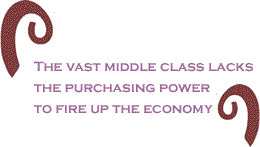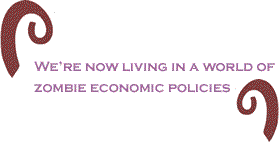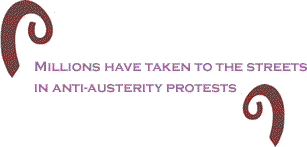| Rest assured. The specter
of socialism is not haunting Europe
right now. Francois Hollande is “hardly a rabid socialist”
say the editors of the Financial Times. The New
York Times chimes in that he is a “cautious moderate
on most issues, and certainly not a socialist in the historic
meaning of that term.” And, we are informed by Thomas Klau
of the European Council on Foreign Relations, that Hollande
“is neither a demagogue nor a revolutionary firebrand.”
But Socialist or not, the Financial Times editors
conclude that the French Socialist Party presidential candidate
“would channel the government’s taxing and spending power
to promote faster economic growth and recovery as a surer
route to long-term fiscal balance,” and what with “austerity’s
disastrous results sparking discontent in a growing number
of European countries, a Hollande victory could signal a
continental turning point.”
Actually, what is happening in France
is not a unique turning point but one of many indicating
that winds of change are blowing fiercely from Prague
to Athens, from Amsterdam to Paris.
With Hollande likely to become the next president
of France,” writes Washington Post columnist David
Ignatius, “Europe’s hot populist anger is about to confront
the cold austerity measures required by the euro zone, with
a predictable result: a storm that rattles the foundations
of the European economic house.”

This situation is not simple nor without
dangers. While some (even some on the left in this country)
are trying to play it down, European reactionaries are on
the move as well. As could be expected, people seeking simple
answers to their nation’s plight are being seduced by those
seeking to scapegoat immigrants, not only from Asia, Africa
or Latin America but from other European
countries as well. The fires of racism, Islamaphobia, and
anti-Semitism are being carefully stoked.
But the main thrust of opposition to the
policies that contributed to the ongoing crisis that falls
under the rubric “neo-liberalism” and the policy of retrenchment
or “austerity” is coming from the left.
Over the past two weeks, Hollande has emerged
as the leading candidate for the president of France;
the center-right government of The Netherlands has collapsed;
the conservative government in Romania
totters, as does the reigning conservative regime in the
Czech Republic. That’s on the electoral front;
meanwhile, millions have taken to the streets in anti-austerity
protests.
The major media has pretty much shied away
from giving an accurate picture of the European “left” to
which it refers, beyond its assurance that France’s Hollande
is not rabid. But it’s worth talking a look.

In Romania, where an election is scheduled
for November, opinion polls indicate the Social Liberal
Union (USL), the opposition left alliance (currently with
228 seats in the 460 member parliament), has more than 50
percent support and would most likely win an election. It
is headed by 39-year-old Victor Ponta, head of the left-leaning
opposition Social Liberal Union (USL). Ponta, who has won
medals in basketball and auto racing, is from the center-left
Social Democrat Party and now serves as interim prime minister.
Romania has been in recession for the past
two years. Its part in the European austerity drive has
been to slash wages in the public sector and raised sales
taxes. Joblessness is officially only 5 percent in the country
but the worsening economic situation has led to increased
emigration, the population plunging 10 percent over the
past decade.

“Romania’s example
- a ruling center-right party that has struggled to cling
to power through repeated confidence votes that delay reforms
aimed at healing the economy - may serve as a warning to
Czech Prime Minister Petr Necas,” said Reuters last
week. His government is said to have a 16 percent approval
rating.
“The government in Romania
became the latest after the Netherlands
to collapse over budget cuts, and the Czech government could
also be not long for this world,” said the UK’s
Guardian newspaper.
Somewhere between 90,000 and 100,000 people
took to the streets last Saturday in the biggest demonstrations
for decades, and the Romanian trade unions have promised
new protests within the next six weeks.
Meanwhile in The Netherlands, opposition
austerity measures resulted in the fall of the government
of Prime Minister Mark Rutte. The country has been in recession
for nearly a nearly a year. The government resigned after
the rightwing Freedom Party - the Dutch version of France’s National Front of Marine Le Pen - reneged
on a previously agreed upon budget deal. Before leaving
office, Rutte was able to secure agreement on a series of
budget measures from five of the parties represented in
the parliament. However, new elections are scheduled and
here attention has increasingly focused on the leftist Socialist
Party.
The Dutch Socialist Party, the emblem of
which is a tomato, says of itself: “In the final analysis
the SP is a campaigning organization capable of mobilizing
thousands - on occasion tens of thousands - of members and
sympathizers to pursue its goals of equality, solidarity
and human dignity. Campaigns express these principles in
concrete ways which improve lives in the here-and-now, while
the SP never takes its eyes off the prize of a better society
and a better world.”

“Dutch participation in illegal wars abroad
and the neoliberal onslaught on social rights and public
property at home have formed the focus of the party’s major
campaigns in recent years. With energy and militancy, but
also with characteristic humor and color, the SP has demanded
the return of Dutch troops from Afghanistan,
the exposure of the illegal and unconstitutional maneuvering
that led to the country’s support for Bush’s war on Iraq, and an end to the presence of US nuclear
bombs on Dutch soil.”
“The party has resisted the creeping privatization
of health care privatization and the deregulation of postal
services and energy provision, defended vital social programs,
fought the raising of the pension age and the reduction
of state support to students, and called for an end to the
ideologically-motivated neoliberalism which prevails both
at home and in Europe.”
On April 22, the party, the third largest
in the country, called for “a careful budgetary plan that
avoids destroying the economy through spending cuts and
leaves room for a new beginning, while taking into account
the position of people who did not cause the crisis, but
who have been presented with the bill for it,” adding that
whether Hollande in France or the Dutch Labour Party “will
follow through is the question. It is an important test
for the social democrats.”
“Fortunately the real left has also done
well, with the polls giving Jean-Luc Melenchon, the Euro-MP,
who is the presidential candidate of the Front de Gauche,
12 percent of the votes,” said the Dutch socialists. “In
the Netherlands,
the SP with - according to the polls - thirty seats, is
on its way to the top. Melenchon in France
and the SP in the Netherlands
are more badly needed than ever, in order to keep the social
democrats on the right path and put an end to the austerity
diktats from Brussels.”
“The Netherlands has stood steadfastly with the Germans
and has even demanded a little more from Greece and other highly indebted countries,” commented
the German new agency Deutsche Welle. “The fact that the
Dutch government has collapsed over an austerity package
to reduce its own debt is an irony of history.”
Disgruntled Voters will also head to the
polls in Greece this weekend. There, left and anti-austerity
parties, including the Coalition of the Radical Left (SYRIZA),
the Center-Left Democratic Left (Dimar), the Ecogreens (Ikologi
Prasini) and the Communist Party (KKE) are predicted to
garner together anywhere between 20 and 35 percent of the
vote. Meanwhile, the far right Golden Dawn party (Chrysi
Avyi) is expected to enter parliament for the first time
with over 3 percent of the vote needed to do so.
With the wrenching economic crisis growing
in Spain and political revolt spreading across the
continent, German Chancellor Angela Merkel has continued
to resolutely defend her focus on euro-zone austerity and
insists that the new EU fiscal pact, signed in March, would
not be revisited. The agreement “cannot be renegotiated,”
she declared last week. However, Hollande has pledged that
if he wins the May 6 runoff, he would ask for changes to
the pact that imposes strict new rules governing budget
deficits and social spending. “It is not Germany
that will decide for the entirety of Europe,”
Hollande responded, “I will tell her that the French people
had made a decision that envisages a renegotiation of the
pact.”

What does all this portend for the United
States? As economist Paul Krugman noted
last week, our country has “never fully embraced the doctrine”
of austerity but has, nonetheless, “had de facto austerity
in the form of huge spending and employment cuts at the
state and local level.” For the good part of that observation
we can thank the not-exactly-overwhelming resistance of
the Obama Administration; for the bad part, credit the Republican
Congressional leadership and its allies in numerous state
governments.
“After a period in which Mr. Obama has pushed
back with some success against demands for austerity, the
Republicans are committed to reversing course, at a time
when demand in the US and the global economy is still weak
and the deficit is at a record,” writes Financial Times
bureau chief Richard McGregor.
“So we’re now living in a world of zombie
economic policies - policies that should have been killed
by the evidence that all of their premises are wrong, but
which keep shambling along nonetheless. And it’s anyone’s
guess when this reign of error will end,” wrote Krugman.
In a commentary titled, “The Lesson for Obama
of Europe’s Failed Austerity,” economist Robert Reich, wrote,
“the president should make it clear he won’t allow government
spending cuts to take precedence over job creation. He won’t
follow Europe into an austerity trap
of slower growth and higher unemployment. While he understands
the need to reduce the nation’s long-term budget deficit,
he should commit to vetoing any spending cuts until the
unemployment rate in the US is down to 5 percent. Instead, he should commit
to further job-creating investments in the nation’s crumbling
infrastructure - pot-holed roads, unsafe bridges, inadequate
pipelines, woefully-strained public transportation, and
outmoded ports.”
“Finally, Obama should make sure Americans
understand the link between America’s fragile recovery and widening inequality,”
continued Reich. “As long as so much of the nation’s disposable
income and wealth goes to the top, the vast middle class
lacks the purchasing power to fire up the economy. That’s
why the so-called ‘Buffett rule’ he has proposed - setting
a minimum tax rate for millionaires - needs to be seen as
just a first step toward ensuring that the gains from growth
are more widely shared. He should vow to do more in his
second term.”
“But to put any of this into effect, Obama
will need a Congress that’s committed to better jobs and
wages for all Americans,” says Reich. “He should remind
voters that congressional Republicans prevented him from
doing all that was needed in the first term, and they must
not be allowed to do so again.”
The Republicans have repeatedly suggested
that the U.S.
could become “another Greece”
and well it might if they get their way and the austerity
of budget cuts and layoffs continue. Only strong popular
resistance can prevent it and an invigorated and united
left can, and should, help bring that about.

BlackCommentator.com Editorial Board member
Carl Bloice is a writer in San Francisco, a member of the National Coordinating Committee of
the Committees of Correspondence for Democracy and Socialism and formerly worked for
a healthcare union. Click here to contact Mr. Bloice.
|

